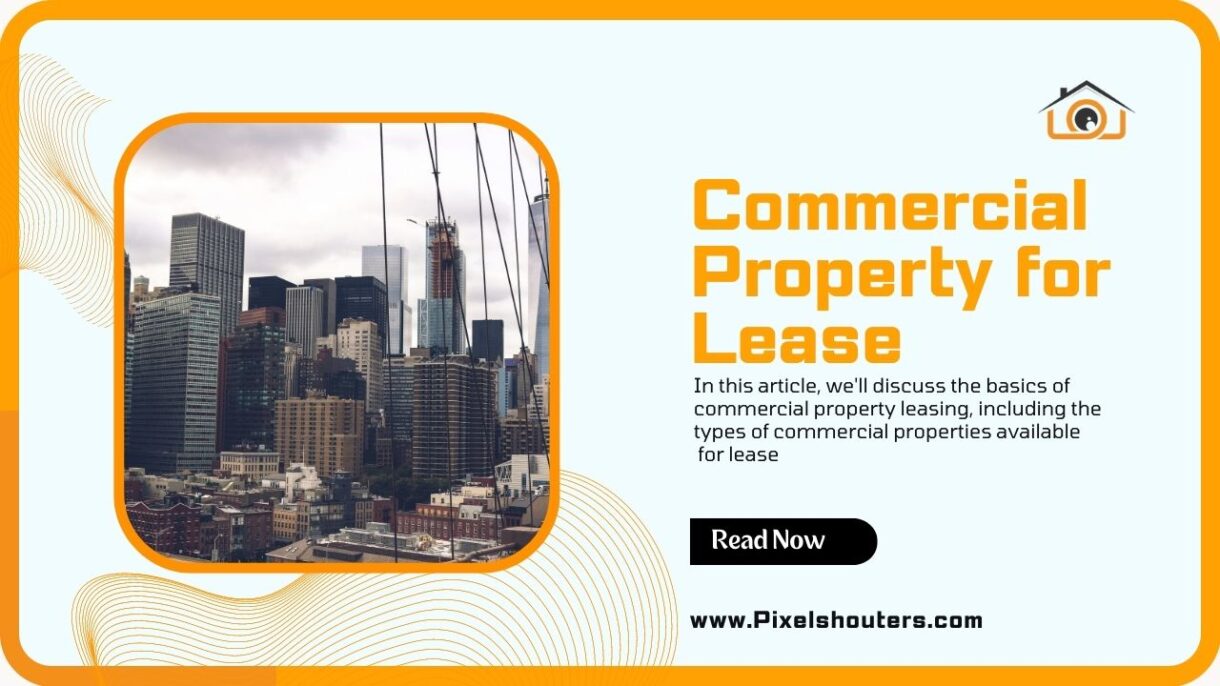Commercial Property for Lease: A Guide for Tenants
When it comes to starting a business or expanding an existing one, finding the right space is crucial. For many businesses, commercial property leasing is an attractive option. In this article, we’ll discuss the basics of commercial property leasing, including types of commercial properties available for lease, pros and cons of leasing commercial property, how to find commercial property for lease, factors to consider when leasing commercial property, negotiating a commercial lease, preparing to lease commercial property, and steps involved in signing a commercial lease.
Table of Contents
Types of Commercial Property for Lease
Commercial property is any property that is used for business purposes, such as office buildings, retail spaces, warehouses, and mixed-use properties. Depending on the type of business, different types of commercial properties may be more suitable for lease. Here’s a closer look at each type of commercial property:
A. Office spaces
Office spaces are designed for businesses that need a professional environment to conduct their daily operations. These spaces can range from small, single-person offices to large, multi-floor buildings. Many office spaces come equipped with basic amenities, such as internet access, phone lines, and air conditioning.
B. Retail spaces
Retail spaces are designed for businesses that need a physical storefront to sell goods or services to customers. These spaces can range from small, single-unit storefronts to large, multi-unit shopping centers. Retail spaces often come with additional amenities, such as storefront windows, ample parking, and signage.
C. Warehouses and industrial spaces
Warehouses and industrial spaces are designed for businesses that need large, open spaces for storage or manufacturing purposes. These spaces can range from small, single-unit warehouses to large, multi-unit industrial complexes. Many warehouses and industrial spaces come equipped with loading docks, ample storage space, and heavy-duty electrical systems.
D. Mixed-use properties

Mixed-use properties are designed for businesses that need a combination of office, retail, and residential space. These properties can range from small, single-unit buildings to large, multi-unit developments. Many mixed-use properties come equipped with amenities, such as conference rooms, parking garages, and on-site restaurants.
Pros and Cons of Leasing Commercial Property
Before deciding whether to lease commercial property, it’s important to understand the pros and cons. key points to consider:
Pros:
- Leasing commercial property often requires less upfront capital than purchasing a property.
- Leasing commercial property can offer greater flexibility, allowing businesses to move to a new location if necessary.
- Leasing commercial property often comes with maintenance and repair responsibilities that are the landlord’s responsibility.
Cons:
- Leasing commercial property may be more expensive in the long run than purchasing a property.
- Leasing commercial property may limit a business’s ability to customize the space to fit its needs.
- Leasing commercial property often comes with strict lease terms and conditions that must be adhered to.
How to Find Commercial Property for Lease
There are several ways to find commercial property for lease. Options to consider:
A. Online resources
The internet has made it easier than ever to find commercial property for lease. Many commercial real estate websites offer searchable databases of available properties in a given area. Some of the most popular sites include LoopNet, CoStar, and RealNex.
B. Working with a commercial real estate agent
Working with a commercial real estate agent can be a great way to find commercial property for lease. Agents have access to a wide range of properties and can help businesses identify spaces that meet their needs. Additionally, agents can help businesses negotiate lease terms and conditions.
C. Referrals and networking
Referrals and networking can also be effective ways to find commercial property for lease. Business owners can reach out to their networks to see if anyone knows of any available properties, or they can ask for referrals from other business owners in their industry. Additionally, attending industry events and networking with other professionals can help business owners learn about available properties.

Factors to Consider When Leasing Commercial Property
When leasing commercial property, there are several factors to consider. key points to keep in mind:
Location
Location is one of the most important factors to consider when leasing commercial property. Businesses should look for properties that are easily accessible to customers, employees, and suppliers. Additionally, businesses should consider the local market and competition in the area.
Size and layout
Businesses should also consider the size and layout of the space they are leasing. The space should be large enough to accommodate the business’s needs, but not so large that it becomes inefficient or difficult to manage. Additionally, the layout of the space should be conducive to the business’s operations.
Lease terms and conditions
Lease terms and conditions can vary widely depending on the landlord and property. Businesses should carefully review the terms and conditions of the lease before signing. Important factors to consider include the length of the lease, rent increases, maintenance responsibilities, and options for renewal.
Negotiating a Commercial Lease
When leasing commercial property, it’s important to negotiate the terms and conditions of the lease. Here are a few tips:
Understand your needs
Before entering into lease negotiations, businesses should have a clear understanding of their needs. This includes understanding the size and layout of the space they require, as well as any specific amenities or features they require.
Research the market
Businesses should also research the local market to understand what is typical in terms of lease terms and conditions. This can help them negotiate more effectively.
Be prepared to walk away
If the terms of the lease are not acceptable, businesses should be prepared to walk away from the negotiation. It’s better to find a space that meets the business’s needs and budget than to agree to unfavorable lease terms.
Preparing to Lease Commercial Property
Before signing a commercial lease, there are several steps businesses should take to prepare. There’s a closer look at each step:
Review the lease
Businesses should carefully review the terms and conditions of the lease before signing. It may be helpful to have an attorney review the lease as well.
Conduct due diligence
Before signing a lease, businesses should conduct due diligence to ensure the property meets their needs. This may include inspecting the property, reviewing financial records, and checking with local zoning authorities.
Secure financing
If financing is needed to secure the lease, businesses should secure financing before signing the lease.

Steps Involved in Signing a Commercial Lease
Once businesses have found a suitable commercial property and negotiated lease terms, there are several steps involved in signing the lease. there’s a closer look at each step:
Sign the lease
The first step in signing a commercial lease is to sign the lease agreement. The agreement must be signed by both the landlord and the renter.
Provide payment
The tenant will typically need to provide payment at the time of signing. This may include a security deposit, the first month’s rent, and any other fees outlined in the lease.
Take possession of the property
Once the lease has been signed and payment has been made, the tenant can take possession of the property. This may involve moving in equipment, furniture, and other items needed for the business.
Conclusion
commercial property for lease can be a great option for businesses looking to expand or start a new venture. By understanding the types of commercial properties available, the pros and cons of leasing, and the factors to consider when leasing, businesses can make informed decisions about their real estate needs. It’s important to carefully review lease terms and conditions, negotiate effectively, and conduct due diligence before signing a lease. By taking these steps, businesses can find the right commercial property for their needs and set themselves up for success.
